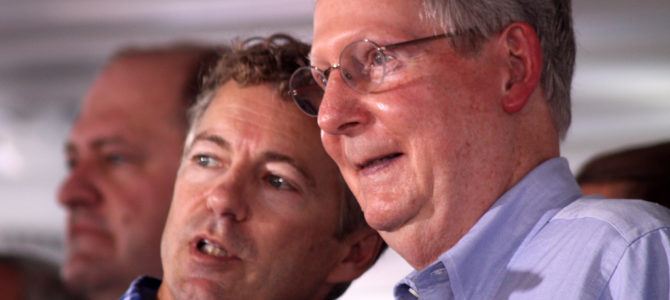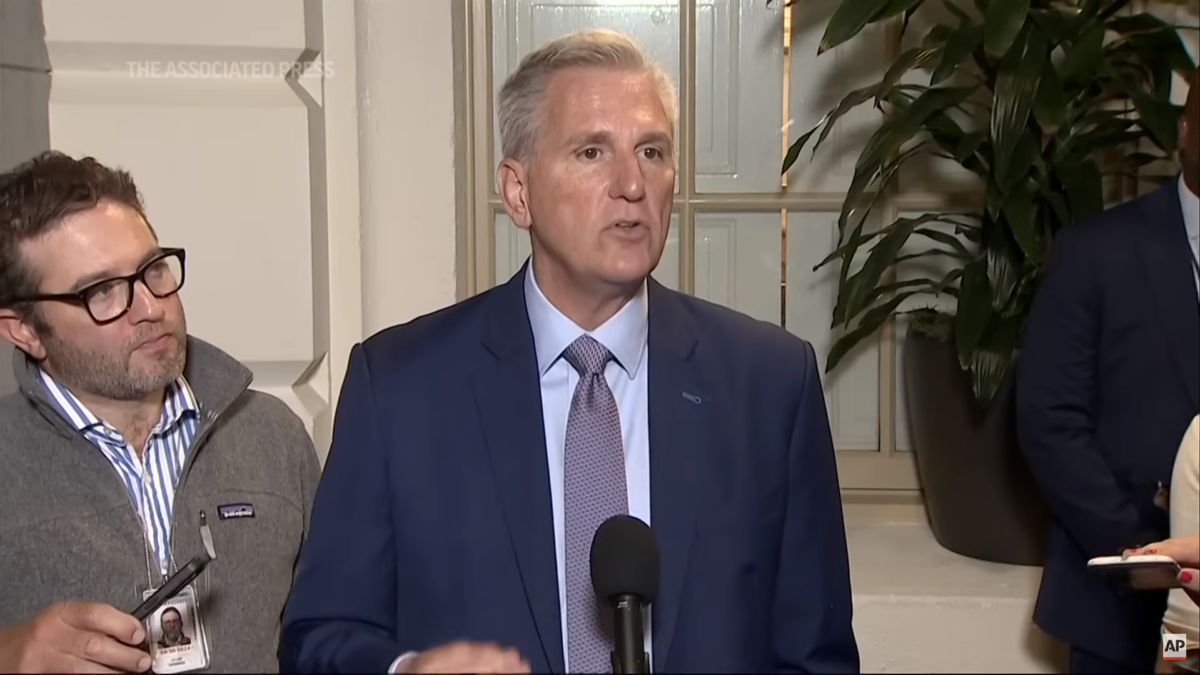
So much for the romance surrounding the famous scene in “Mr. Smith Goes to Washington” where the title character successfully filibusters a bill, rousing the public to his side. Politico claimed that similar tactics surrounding a budget agreement last week led to the “dumbest shutdown ever.” In reality, however, the brief lapse in appropriations had serious underlying causes, and the flip way its correspondents covered the incident led to arguably the dumbest headline in Politico’s history.
To explain the shutdown in brief: Congressional leaders arrived at a budget agreement last week, just before the existing spending bill expired on Thursday at midnight. Having only introduced the bill hours previously, Senate leaders pushed to pass it Thursday afternoon, before the prior spending bill expired.
However, Sen. Rand Paul (R-Kentucky), frustrated by both the higher levels of spending in the agreement and Senate leaders’ refusal to allow votes on his amendments to reduce that spending, prevented a vote on passing the agreement until early Friday morning—causing an all-night session of Congress, and a brief shutdown of the federal government until the spending bill was signed into law.
Paul’s actions protested two important issues: Skyrocketing spending and deficits, and Congress passing massive spending bills without reading them or allowing anyone to offer amendments. But the Politico report by Rachael Bade and Seung Min Kim trivialized the incident, calling it a “spectacle,” “extraneous drama,” and a “sideshow” full of “absurdity.” Their own phraseology amplified quotes such as those from an unnamed Republican aide, who called the floor drama “even more stupid than the name of the new Kardashian baby.”
So Paying for Stuff Congress Buys Is ‘Stupid’?
Why would reporters take such a cavalier attitude toward otherwise weighty matters? Four possible reasons come to mind.
First, the natural inclination to blame the individual or individuals perceived as responsible for causing havoc with the schedule. Few politicians or reporters on Capitol Hill expected to spend Thursday evening and much of Friday morning covering all-night drama surrounding the appropriations bill. The missed flights, cancelled dinner plans, and other last-minute chaos largely redounded on Paul’s head, even though Senate leaders could, and should, have avoided that drama by planning more than a few hours ahead.
Second, a desire to avoid antagonizing leadership officials who provide reporters valuable intelligence and gossip. Another Politico article published Thursday noted that “leaders miscalculated by waiting until the last minute and hoping Paul would go along”—but waited to do so until its twenty-first paragraph.
If, instead of the headline at issue, Politico had led its story by pointing out that tactical stupidity by Senate Majority Leader Mitch McConnell (R-Kentucky) led to the shutdown—belying his November 2014 and December 2017 statements that “We will not be shutting down the government”—how quickly do you think the majority leader’s press staff would have responded to Politico reporters’ questions this week?
Always Selective ‘Concern’ for Process
Third, reporters’ natural bias towards bipartisan agreements, underpinned by an implicit assumption that bipartisan agreements are inherently good. Whereas last year’s partisan attempts to “repeal-and-replace” Obamacare led to myriad stories about Republicans violating their pledges for transparency (an exception to rule two above), the bipartisan budget deal aroused much less indignation from the press about the secretive process used to craft it.
A contrarian might ask the obvious question: If the bill is so good, why not give lawmakers time to read and understand its contents, rather than ramming through a 652-page bill spending hundreds of billions of dollars in a 24-hour period?
Fourth, for all their self-righteousness about the First Amendment, reporters don’t demonstrate a consistent concern for other parts of the democratic process. If senators had denied reporters access to areas of the Capitol, and claimed that they didn’t want to “reward bad behavior”—as Senate Majority Whip John Cornyn (R-Texas) said of Paul’s demand for an amendment vote—would those reporters have merely recorded Cornyn’s words and left the issue alone, as Politico’s reporters did?
Of course not. But when officials at the Centers for Medicare and Medicaid Services (CMS) earlier this month tried to shut out a reporter for what CMS officials viewed as an inaccurate article—or, to coin a phrase, “bad behavior” by a journalist—the Association of Health Care Journalists filed protests with CMS, and published multiple stories on the kerfuffle (which Politico dutifully covered).
If they care about democracy as much as they claim, the reporters who consistently hyperventilate every time President Trump makes (idle) threats towards the press might spend more time promoting sunshine and accountability throughout government. But instead of highlighting Paul’s efforts to enhance transparency in government—is a single amendment vote on a 652-page bill really too much to ask?—the “dumbest shutdown ever” story ridiculed these efforts. It’s why the story represents Politico’s dumbest headline ever.
Mr. Jacobs is founder and CEO of Juniper Research Group, a policy consulting firm based in Washington. He is on Twitter: @chrisjacobsHC.









